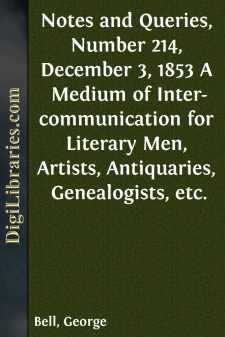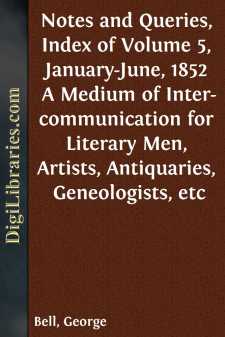Categories
- Antiques & Collectibles 13
- Architecture 36
- Art 48
- Bibles 22
- Biography & Autobiography 813
- Body, Mind & Spirit 142
- Business & Economics 28
- Children's Books 17
- Children's Fiction 14
- Computers 4
- Cooking 94
- Crafts & Hobbies 4
- Drama 346
- Education 46
- Family & Relationships 57
- Fiction 11829
- Games 19
- Gardening 17
- Health & Fitness 34
- History 1377
- House & Home 1
- Humor 147
- Juvenile Fiction 1873
- Juvenile Nonfiction 202
- Language Arts & Disciplines 88
- Law 16
- Literary Collections 686
- Literary Criticism 179
- Mathematics 13
- Medical 41
- Music 40
- Nature 179
- Non-Classifiable 1768
- Performing Arts 7
- Periodicals 1453
- Philosophy 64
- Photography 2
- Poetry 896
- Political Science 203
- Psychology 42
- Reference 154
- Religion 513
- Science 126
- Self-Help 84
- Social Science 81
- Sports & Recreation 34
- Study Aids 3
- Technology & Engineering 59
- Transportation 23
- Travel 463
- True Crime 29
Notes and Queries, Number 206, October 8, 1853 A Medium of Inter-communication for Literary Men, Artists, Antiquaries, Genealogists, etc.
by: George Bell
Categories:
Description:
Excerpt
NOTES ON NEWSPAPERS: "THE TIMES," DAILY PRESS, ETC.
A newspaper, rightly conducted, is a potent power in promoting the well-being of universal man. It is also a highly moral power—for it quickens mind everywhere, and puts in force those principles which tend to lessen human woe, and to exalt and dignify our common humanity. The daily press, for the most part, aims to correct error—whether senatorial, theological, or legal. It pleads in earnest tones for the removal of public wrong, and watches with a keen eye the rise and fall of great interests. It teaches with commanding power, and makes its influence felt in the palace of the monarch, as well as through all classes of the community. It helps on, in the path of honorable ambition, the virtuous and the good. It never hesitates or falters, however formidable the foe. It never crouches, however injurious to itself the free and undisguised utterance of some truths may be. It is outspoken. When the nation requires them, it is bold and fearless in propounding great changes, though they may clash with the expectations of a powerful class. It heeds the reverses to which a nation is subjected, and turns them to good account. It does not abuse its power, and is never menaced. It is unshackled, and therefore has a native growth. It looks on the movements of the wide world calmly, deliberately, and intelligently. We believe the independency of the daily press can never be bribed, or its patronage won by unlawful means. Its mission is noble, and the presiding sentiment of the varied intellect employed upon it is "the greatest good to the greatest number." It never ceases in its operations. It is a perpetual thing: always the same in many of its aspects, and yet always new. It is untiring in its efforts, and unimpeded in its career. We look for it every day with an unwavering confidence, with an almost absolute certainty. Power and freshness are its principal characteristics; and with these it combines a healthy tone, a fearless courage, and an invincible determination. That it has its imperfections, we do not deny—and what agency is without them? It is not free from error, and no estate of the realm can be. The purity of the public press will be increased as Christianity advances. There is no nation in the world which can boast of a press so moral, and so just, as the daily newspaper press of Great Britain. The victories it achieves are seen and felt by all: and when compared with the newspaper press of other countries, it has superior claims to our admiration and regard.
Taking The Times as the highest type of that class of newspapers which we denominate the daily press, these remarks will more particularly apply. The history of such a paper, and its wonderful career, is not sufficiently known, and its great commercial and intellectual power not adequately estimated. The extinction of such a journal (could we suppose such a thing,) would be a public calamity. Its vast influence is felt throughout the civilised world; and we believe that influence, generally speaking, is on the side of right, and for the promotion of the common weal....












